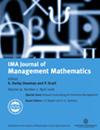Cooperative strategies of emission reduction in the 3PL-led supply chain
IF 4.3
3区 工程技术
Q3 MANAGEMENT
引用次数: 0
Abstract
The 3PL industry has grown rapidly over the past few years, and its emission reduction behavior is gaining attention. This paper considers a supply chain system composed of a manufacturer, a retailer, and a third-party logistics provider (3PL), in which both the manufacturer and the 3PL make the low-carbon investment. 3PL is a leader in the low-carbon supply chain. To promote emission reduction in logistics, the manufacturer and the retailer separately share the logistics emission reduction costs of the 3PL. Through comparing the no-sharing, manufacturer-sharing, and retailer-sharing models, we discuss the cost-sharing strategy preference of each participant and analyze the impact on environmental benefit and social welfare. The results show that cost-sharing can effectively improve product demand, which also supports society in obtaining higher benefits. Moreover, the 3PL tends to be shared by the retailer when the low-carbon investment cost of logistics is high and the investment cost of production is low. Both the manufacturer and the retailer prefer the other party to share the cost, but sharing it together can effectively alleviate free-rider behavior.以第三方物流为主导的供应链中的减排合作战略
第三方物流行业在过去几年中发展迅速,其减排行为也日益受到关注。本文考虑了一个由制造商、零售商和第三方物流提供商(3PL)组成的供应链系统,其中制造商和第三方物流提供商都进行了低碳投资。3PL 是低碳供应链的领导者。为促进物流减排,制造商和零售商分别分摊 3PL 的物流减排成本。通过比较无分担模式、制造商分担模式和零售商分担模式,探讨各参与方的成本分担策略偏好,并分析其对环境效益和社会福利的影响。结果表明,成本分担能有效提高产品需求,也有助于社会获得更高的利益。此外,当物流低碳投资成本较高而生产投资成本较低时,3PL 倾向于由零售商分担。制造商和零售商都希望对方分担成本,但共同分担成本可以有效缓解搭便车行为。
本文章由计算机程序翻译,如有差异,请以英文原文为准。
求助全文
约1分钟内获得全文
求助全文
来源期刊

IMA Journal of Management Mathematics
OPERATIONS RESEARCH & MANAGEMENT SCIENCE-MATHEMATICS, INTERDISCIPLINARY APPLICATIONS
CiteScore
4.70
自引率
17.60%
发文量
15
审稿时长
>12 weeks
期刊介绍:
The mission of this quarterly journal is to publish mathematical research of the highest quality, impact and relevance that can be directly utilised or have demonstrable potential to be employed by managers in profit, not-for-profit, third party and governmental/public organisations to improve their practices. Thus the research must be quantitative and of the highest quality if it is to be published in the journal. Furthermore, the outcome of the research must be ultimately useful for managers. The journal also publishes novel meta-analyses of the literature, reviews of the "state-of-the art" in a manner that provides new insight, and genuine applications of mathematics to real-world problems in the form of case studies. The journal welcomes papers dealing with topics in Operational Research and Management Science, Operations Management, Decision Sciences, Transportation Science, Marketing Science, Analytics, and Financial and Risk Modelling.
 求助内容:
求助内容: 应助结果提醒方式:
应助结果提醒方式:


